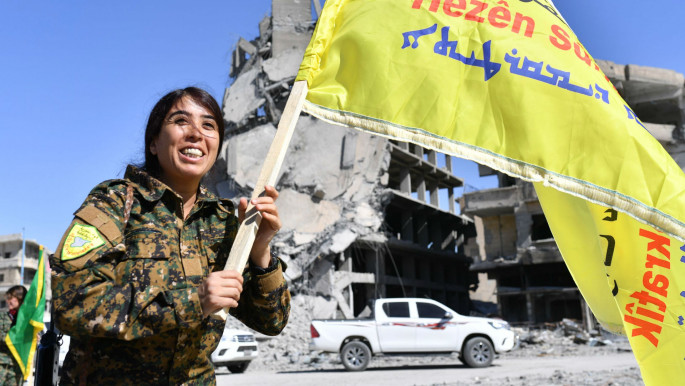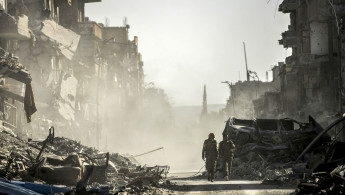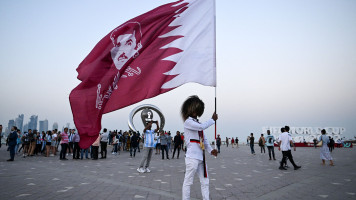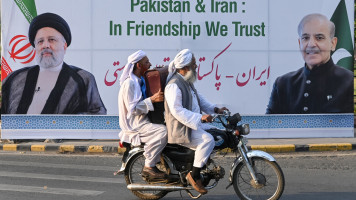Raqqa after the Islamic State group: Inside the city of death
Raqqa after the Islamic State group: Inside the city of death
As one of the first Westerners to visit Raqqa after its liberation, Norwegian activist Erling Folkvord witnessed how the brutality of IS had coloured daily life in the battered city.
5 min read
Despite being liberated from IS, much of Raqqa now lies in ruins [AFP]
"Entering the city was indescribable. It was like taking part in something historic, something I will never forget," says Erling Folkvord on the phone from Syria.
For nearly four years, Raqqa was the feared capital of the "Caliphate of Daesh", the Islamic State group. It was from here extreme Islamists planned attacks against European cities. It was here a new era of Islamic glory was to begin.
But in the city everyday life was brutal almost beyond comprehension.
For nearly four years, Raqqa was the feared capital of the "Caliphate of Daesh", the Islamic State group. It was from here extreme Islamists planned attacks against European cities. It was here a new era of Islamic glory was to begin.
But in the city everyday life was brutal almost beyond comprehension.
"Here people were beheaded," says Folkvord, describing a roundabout, an open space, where, frequently, people were executed for even the slightest violations of IS' fundamentalist laws. But it did not stop with the beheadings.
"After the executions, the heads were put on posts around here, so everyone would see them. Only the heads, without the torsos. And the heads were on display there while people walked past in the streets," Folkvord says in an interview with The New Arab.
Dangerous
"After the executions, the heads were put on posts around here, so everyone would see them. Only the heads, without the torsos. And the heads were on display there while people walked past in the streets," Folkvord says in an interview with The New Arab.
Dangerous
Folkvord, a well-known 68-year-old Norwegian activist for Kurdish rights, travelled to northern Syria this month to observe local attempts at "building a democracy" in self-controlled areas. He was unarmed in one of the world's most dangerous corners; a region where Westerners have been kidnapped and killed in recent years.
The Norwegian was in Raqqa on Friday, one of the very first Westerners in the city - just three days after IS was defeated here. Destruction is everywhere. It was the Syrian Democratic Forces (SDF), a Kurdish-dominated militia which had previously partnered with the Assad regime to retake Aleppo, which conquered Raqqa - while US planes bombed from the air.
The Norwegian was in Raqqa on Friday, one of the very first Westerners in the city - just three days after IS was defeated here. Destruction is everywhere. It was the Syrian Democratic Forces (SDF), a Kurdish-dominated militia which had previously partnered with the Assad regime to retake Aleppo, which conquered Raqqa - while US planes bombed from the air.
Raqqa is still by no means safe. Folkvord knows that IS has probably planted bombs at various places around the city, and it is dangerous to walk the narrow alleys. Whether any IS fighters are still hiding in homes, nobody knows.
"Large parts of the city are in ruins. At the same time I saw some four- and five-storey houses that were still standing. I also saw several minarets that seemed to be unharmed," says Folkvord.
"Large parts of the city are in ruins. At the same time I saw some four- and five-storey houses that were still standing. I also saw several minarets that seemed to be unharmed," says Folkvord.
 |
IS was so visually and sadistically brutal that the group managed to shock the whole world with the extreme violence |  |
For nearly four years Raqqa was a source of inspiration for thousands of young Muslims in Western Europe. They found their way through Turkey to the city, which, back in the 8th century actually the capital of a caliphate.
The foreigners, often with their families, lived in apartments spread around the city, usually in better conditions than the city's original population.
At least 500,000 people have been killed so far in Syria's seven-year civil war. At its peak, IS controlled nearly half of Syria and a third of Iraq. In Syria, President Bashar al-Assad's forces have been responsible for the vast majority of the casualties. But still, IS was so visually and sadistically brutal that the group managed to shock the whole world with the extreme violence human beings evidently were able to inflict on each other.
One man in Raqqa was executed by being flattened by a steamroller. The video was uploaded online.
Others were placed inside an iron cage and drowned in a pool. Others were burned alive, or tied up and then shot by children.
After IS executed several Americans in 2015, President Barack Obama declared war. Raqqa alone was bombed more than 5,000 times. Assad in Damascus, further south, was spared.
Dance
In Raqqa on Friday, the Norwegian activist participated in the celebrations held at the city's sports stadium. People sang and danced - both illegal during IS rule. Three days earlier, forces were still fighting in the city, and captive IS fighters had been detained in the same sports arena that was now one big party.
The future of the captured IS fighters remains uncertain. They were transported beyond the city borders.
Many women in the streets had already removed their niqab that was compulsory under IS rule. But the road ahead for all people of Raqqa, men and women, will be hard and long.
"A woman wearing a niqab made the V-sign to me, but most of them already walked around without their veil," says Folkvord. "People were smiling but at the same time you saw the sadness in their eyes. It's hard to even imagine what they've been through."
One encounter that came to shock the Norwegian the most took place in a small cinema, not far from the roundabout where civilians had been beheaded.
"The inhabitants told me that here children were forced to watch beheadings. They were placed in front of the screen, and had to follow the many executions, see how their opponents were killed," says Folkvord. The screen is still there, though the building had partially been destroyed by the fighting.
"Ruins can be seen everywhere. The reconstruction will be enormous. That's what everything depends on now. Otherwise, we will be only have more conflict," he says, warning against believing that all will be over after the liberation.
Back at the stadium, Kurds, Arabs and Turkmen representatives spoke in turns at the stage.
The locals here see "victory in Raqqa as the beginning of a free and democratic Syria", Folkvord says. "But Turkish forces further north have already moved in to make sure the Kurds won't get too strong. And in his palace in Damascus, Assad is safer than at any time in the past seven years."
The foreigners, often with their families, lived in apartments spread around the city, usually in better conditions than the city's original population.
At least 500,000 people have been killed so far in Syria's seven-year civil war. At its peak, IS controlled nearly half of Syria and a third of Iraq. In Syria, President Bashar al-Assad's forces have been responsible for the vast majority of the casualties. But still, IS was so visually and sadistically brutal that the group managed to shock the whole world with the extreme violence human beings evidently were able to inflict on each other.
One man in Raqqa was executed by being flattened by a steamroller. The video was uploaded online.
Others were placed inside an iron cage and drowned in a pool. Others were burned alive, or tied up and then shot by children.
After IS executed several Americans in 2015, President Barack Obama declared war. Raqqa alone was bombed more than 5,000 times. Assad in Damascus, further south, was spared.
Dance
In Raqqa on Friday, the Norwegian activist participated in the celebrations held at the city's sports stadium. People sang and danced - both illegal during IS rule. Three days earlier, forces were still fighting in the city, and captive IS fighters had been detained in the same sports arena that was now one big party.
The future of the captured IS fighters remains uncertain. They were transported beyond the city borders.
Many women in the streets had already removed their niqab that was compulsory under IS rule. But the road ahead for all people of Raqqa, men and women, will be hard and long.
"A woman wearing a niqab made the V-sign to me, but most of them already walked around without their veil," says Folkvord. "People were smiling but at the same time you saw the sadness in their eyes. It's hard to even imagine what they've been through."
 |
| A Syrian Democratic Forces Commander celebrates on the streets of Raqqa [AFP] |
"The inhabitants told me that here children were forced to watch beheadings. They were placed in front of the screen, and had to follow the many executions, see how their opponents were killed," says Folkvord. The screen is still there, though the building had partially been destroyed by the fighting.
"Ruins can be seen everywhere. The reconstruction will be enormous. That's what everything depends on now. Otherwise, we will be only have more conflict," he says, warning against believing that all will be over after the liberation.
Back at the stadium, Kurds, Arabs and Turkmen representatives spoke in turns at the stage.
The locals here see "victory in Raqqa as the beginning of a free and democratic Syria", Folkvord says. "But Turkish forces further north have already moved in to make sure the Kurds won't get too strong. And in his palace in Damascus, Assad is safer than at any time in the past seven years."
Roger Hercz is the Middle East correspondent of the Norwegian newspaper Dagsavisen



